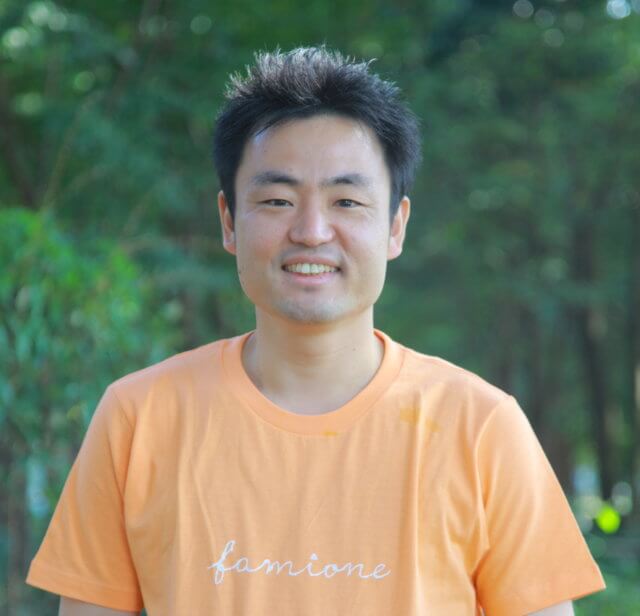Increasing Chances of Conception Through Lifestyle Support: Famione (Part 2)
According to the "15th Research Study on Birthrate Trends" conducted by the National Institute of Population and Social Security Research (IPSS) in 2015, about 1 in 6 couples face struggles when it comes to changing their lifestyle to increase their chances of conception. However, for many people, the problem isn't as straightforward as undergoing fertility treatments; the problem also includes doubt, anxiety, and stress when they face suggested changes in their daily lifestyles.
In hope of tackling this issue Famione was established in June of 2015, with a vision to "support couples who wish to have children" by tackling the problem of conception through provision of both medical and personal advice. Ishikawa Yusuke, Famione's founder and managing director, shares with us about FLIPP (a personal support service for women who wish to conceive), the company's plans for the future, and their background.
Read Part 1 here.
Famione also runs a media site called "famit", which focuses on providing information for couples who wish to start a family in the future. What are "famit"'s goals?
The site was launched to spread medical expertise we've gained through interviewing specialists with the aim to provide support and solve issues faced by many families. We find it to be extremely important for people who are undergoing fertility treatments or trying to conceive to hear from people who actually had the experience. A reader who is hesitant about undergoing a certain medical examination could read up about people who have also faced the same issue. This can help to lessen their anxiety and make it easier for them to take the first step forward. That's the impact we hope the site will have.
The site is currently being updated, and we hope to develop a place where people can discuss fertility issues and form member-limited Q&A communities where couples can ask for and receive real opinions from medical experts. While it is possible to ask for advice from friends and family, these opinions may be biased and people could end up unintentionally giving bad advice.
We are currently in the process of renewing the website. We find that Q&A forums could become a community platform where people in different stages of can all gather. I often hold hearings from people I personally know, but the thing is, it lacks in range and ‘realness’. The community would be able to have people in all stages, those who are wondering if they should start a family, those who are trying to conceive, those who are already pregnant, and more can all share information. Through discussions on the forums and the voices of individual users, we can also get a better understanding what people need. For example, we may see that many seek for advice on how to balance both pregnancy and work, or how to gather information on the success rates of fertility clinics. Taking note of such concrete issues is essential to developing our services.
Therefore, the site and communities will be very helpful in improving FLIPP and refining our service's mission.
Did you face any obstacles getting the business started?
To be honest, we're still facing a few obstacles. We need to gather user feedback to understand the service that is in demand through receiving and understanding all types of feedback. The root of medical treatment is to heal an illness, or lessen pain. In Famione's case, our users' most pressing need is to conceive. However, there is no 100% guaranteed way of meeting that need, even with the help of medical experts. Thus, our task and goal is not as simple and clear as trying to treat an illness or heal someone.
In this circumstance, how valuable will FLIPP's delivery packages and information be to couples? What must we do to make users appreciate our service? These are the questions I often ask myself.
The second problem concerns raising awareness about conception and fertility treatment. In reality, it is best to gain reliable information about conception and pregnancy long before trying to conceive. However, it's going to take a long time to convince people who do not have fertility problems right now to understand the importance of eating and sleeping well.
That is true. It is important to be prepared before the issue of infertility comes up. However, we have limited opportunities now to raise awareness about that.
We're still in the trial-and-error phase, but the targeted demographic isn't just people who wish to conceive, but businesses too. Aside from after-childbirth support provided in the form of maternity and childcare leave, we hope to support businesses who wish to help people who want to conceive, by providing them with welfare programs and information seminars. We're also partnering with the wedding industry to hold workshops for soon-to-be-married couples. We are working on launching events with other businesses and specialists to provide guidance and information on how to improve chances of conception.
Mr Ishikawa, please tell us more about your vision.
Pregnancy is a big life event which can change families, working habits, and lifestyles. Thus, we hope to promote actions and options which will not result in regret, so more people would have a proactive attitude towards conceiving. With the launch of various services, we hope to develop a society and culture where people can openly discuss fertility issues.
Of course, getting pregnant may not be everyone's goal, so we are deffinitely not forcing everyone down that path. Our most important aim is to provide appropriate support for couples who wish to conceive, and we're still working on refining the details. However, it is essential to be aware of the factors that affect conception early on, and to consider getting examinations and treatments done if needed.
With my unwavering grit, I want to strive with the vision of "using my personal struggles to change Japan's future".

